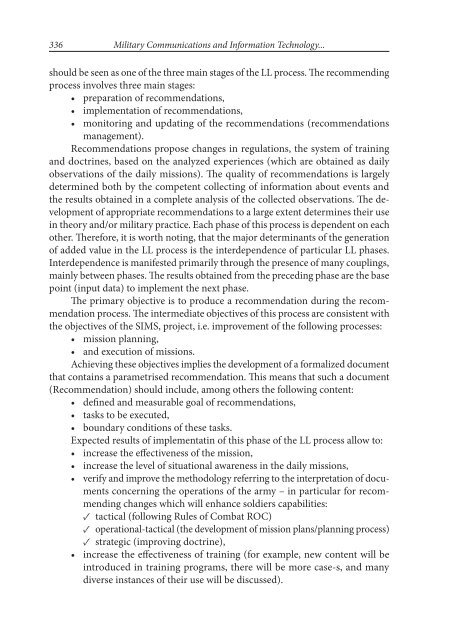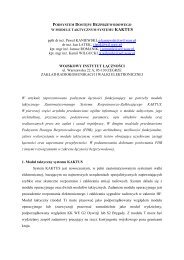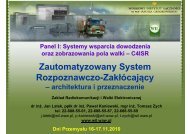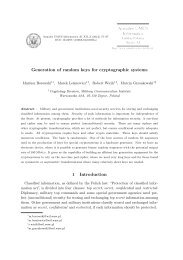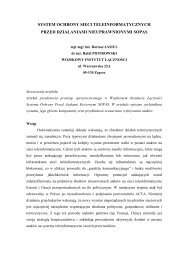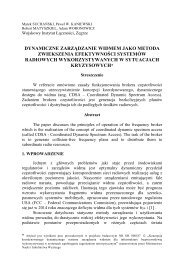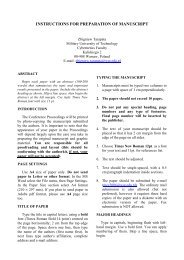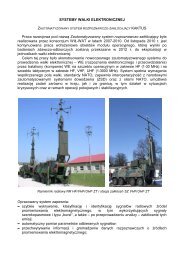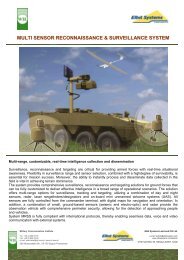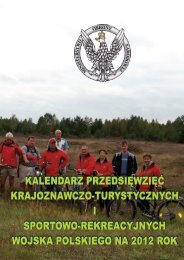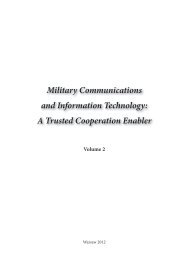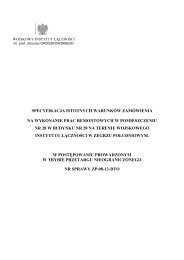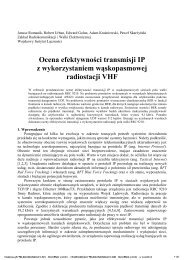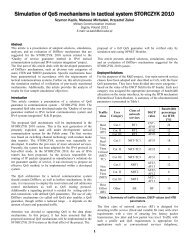- Page 1 and 2:
Military Communications and Informa
- Page 3 and 4:
Contents Foreword .................
- Page 5:
Contents 5 Methodology for Gatherin
- Page 8 and 9:
8 Military Communications and Infor
- Page 11 and 12:
Building a Layered Enterprise Archi
- Page 13 and 14:
Chapter 1: Concepts and Solutions f
- Page 15 and 16:
Chapter 1: Concepts and Solutions f
- Page 17 and 18:
Chapter 1: Concepts and Solutions f
- Page 19 and 20:
Chapter 1: Concepts and Solutions f
- Page 21 and 22:
Applying NAF for Performance Analys
- Page 23 and 24:
Chapter 1: Concepts and Solutions f
- Page 25 and 26:
Chapter 1: Concepts and Solutions f
- Page 27 and 28:
Chapter 1: Concepts and Solutions f
- Page 29 and 30:
Chapter 1: Concepts and Solutions f
- Page 31 and 32:
Chapter 1: Concepts and Solutions f
- Page 33 and 34:
Chapter 1: Concepts and Solutions f
- Page 35 and 36:
Chapter 1: Concepts and Solutions f
- Page 37 and 38:
Openness in Military Systems Jessic
- Page 39 and 40:
Chapter 1: Concepts and Solutions f
- Page 41 and 42:
Chapter 1: Concepts and Solutions f
- Page 43 and 44:
Chapter 1: Concepts and Solutions f
- Page 45 and 46:
Chapter 1: Concepts and Solutions f
- Page 47 and 48:
Chapter 1: Concepts and Solutions f
- Page 49 and 50:
The Concept of Integration Tool for
- Page 51 and 52:
Chapter 1: Concepts and Solutions f
- Page 53 and 54:
Chapter 1: Concepts and Solutions f
- Page 55 and 56:
Chapter 1: Concepts and Solutions f
- Page 57 and 58:
Chapter 1: Concepts and Solutions f
- Page 59 and 60:
Chapter 1: Concepts and Solutions f
- Page 61 and 62:
CFBLNet: A Coalition Capability Ena
- Page 63 and 64:
Chapter 1: Concepts and Solutions f
- Page 65 and 66:
Chapter 1: Concepts and Solutions f
- Page 67 and 68:
Chapter 1: Concepts and Solutions f
- Page 69 and 70:
Chapter 1: Concepts and Solutions f
- Page 71 and 72:
Selected Aspects of Effective RCIED
- Page 73 and 74:
Chapter 1: Concepts and Solutions f
- Page 75 and 76:
Chapter 1: Concepts and Solutions f
- Page 77 and 78:
Chapter 1: Concepts and Solutions f
- Page 79 and 80:
Chapter 1: Concepts and Solutions f
- Page 81:
Chapter 1: Concepts and Solutions f
- Page 84 and 85:
84 Military Communications and Info
- Page 86 and 87:
86 Military Communications and Info
- Page 88 and 89:
88 Military Communications and Info
- Page 90 and 91:
90 Military Communications and Info
- Page 92 and 93:
92 Military Communications and Info
- Page 94 and 95:
94 Military Communications and Info
- Page 96 and 97:
96 Military Communications and Info
- Page 98 and 99:
98 Military Communications and Info
- Page 100 and 101:
100 Military Communications and Inf
- Page 103:
Chapter 2 Communications and Inform
- Page 106 and 107:
106 Military Communications and Inf
- Page 108 and 109:
108 Military Communications and Inf
- Page 110 and 111:
110 Military Communications and Inf
- Page 112 and 113:
112 Military Communications and Inf
- Page 114 and 115:
114 Military Communications and Inf
- Page 116 and 117:
116 Military Communications and Inf
- Page 118 and 119:
118 Military Communications and Inf
- Page 120 and 121:
120 Military Communications and Inf
- Page 122 and 123:
122 Military Communications and Inf
- Page 124 and 125:
124 Military Communications and Inf
- Page 126 and 127:
126 Military Communications and Inf
- Page 128 and 129:
128 Military Communications and Inf
- Page 130 and 131:
130 Military Communications and Inf
- Page 132 and 133:
132 Military Communications and Inf
- Page 134 and 135:
134 Military Communications and Inf
- Page 136 and 137:
136 Military Communications and Inf
- Page 138 and 139:
138 Military Communications and Inf
- Page 140 and 141:
140 Military Communications and Inf
- Page 142 and 143:
142 Military Communications and Inf
- Page 144 and 145:
144 Military Communications and Inf
- Page 146 and 147:
146 Military Communications and Inf
- Page 149 and 150:
Use of Cross Domain Guards for CoNS
- Page 151 and 152:
Chapter 2: Communications and Infor
- Page 153 and 154:
Chapter 2: Communications and Infor
- Page 155 and 156:
Chapter 2: Communications and Infor
- Page 157 and 158:
Chapter 2: Communications and Infor
- Page 159:
Chapter 2: Communications and Infor
- Page 162 and 163:
162 Military Communications and Inf
- Page 164 and 165:
164 Military Communications and Inf
- Page 166 and 167:
166 Military Communications and Inf
- Page 168 and 169:
168 Military Communications and Inf
- Page 170 and 171:
170 Military Communications and Inf
- Page 172 and 173:
172 Military Communications and Inf
- Page 174 and 175:
174 Military Communications and Inf
- Page 176 and 177:
176 Military Communications and Inf
- Page 178 and 179:
178 Military Communications and Inf
- Page 180 and 181:
180 Military Communications and Inf
- Page 182 and 183:
182 Military Communications and Inf
- Page 184 and 185:
184 Military Communications and Inf
- Page 186 and 187:
186 Military Communications and Inf
- Page 188 and 189:
188 Military Communications and Inf
- Page 190 and 191:
190 Military Communications and Inf
- Page 192 and 193:
192 Military Communications and Inf
- Page 194 and 195:
194 Military Communications and Inf
- Page 196 and 197:
196 Military Communications and Inf
- Page 199:
Chapter 3 Information Technology fo
- Page 202 and 203:
202 Military Communications and Inf
- Page 204 and 205:
204 Military Communications and Inf
- Page 206 and 207:
206 Military Communications and Inf
- Page 208 and 209:
208 Military Communications and Inf
- Page 210 and 211:
210 Military Communications and Inf
- Page 212 and 213:
212 Military Communications and Inf
- Page 214 and 215:
214 Military Communications and Inf
- Page 216 and 217:
216 Military Communications and Inf
- Page 218 and 219:
218 Military Communications and Inf
- Page 220 and 221:
220 Military Communications and Inf
- Page 222 and 223:
222 Military Communications and Inf
- Page 224 and 225:
224 Military Communications and Inf
- Page 226 and 227:
226 Military Communications and Inf
- Page 228 and 229:
228 Military Communications and Inf
- Page 230 and 231:
230 Military Communications and Inf
- Page 232 and 233:
232 Military Communications and Inf
- Page 234 and 235:
234 Military Communications and Inf
- Page 236 and 237:
236 Military Communications and Inf
- Page 239 and 240:
Run-Time Ontology on the Basis of E
- Page 241 and 242:
Chapter 3: Information Technology f
- Page 243 and 244:
Chapter 3: Information Technology f
- Page 245 and 246:
Chapter 3: Information Technology f
- Page 247 and 248:
Chapter 3: Information Technology f
- Page 249 and 250:
Chapter 3: Information Technology f
- Page 251 and 252:
Chapter 3: Information Technology f
- Page 253 and 254:
A Robust and Scalable Peer-to-Peer
- Page 255 and 256:
Chapter 3: Information Technology f
- Page 257 and 258:
Chapter 3: Information Technology f
- Page 259 and 260:
Chapter 3: Information Technology f
- Page 261 and 262:
Chapter 3: Information Technology f
- Page 263 and 264:
Chapter 3: Information Technology f
- Page 265 and 266:
Automatic Exploitation of Multiling
- Page 267 and 268:
Chapter 3: Information Technology f
- Page 269 and 270:
Chapter 3: Information Technology f
- Page 271 and 272:
Chapter 3: Information Technology f
- Page 273 and 274:
Chapter 3: Information Technology f
- Page 275 and 276:
Chapter 3: Information Technology f
- Page 277 and 278:
Chapter 3: Information Technology f
- Page 279 and 280:
Chapter 3: Information Technology f
- Page 281 and 282:
Information Fusion Under Network Co
- Page 283 and 284:
Chapter 3: Information Technology f
- Page 285 and 286: Chapter 3: Information Technology f
- Page 287 and 288: Chapter 3: Information Technology f
- Page 289 and 290: Chapter 3: Information Technology f
- Page 291 and 292: Chapter 3: Information Technology f
- Page 293: Chapter 3: Information Technology f
- Page 296 and 297: 296 Military Communications and Inf
- Page 298 and 299: 298 Military Communications and Inf
- Page 300 and 301: 300 Military Communications and Inf
- Page 302 and 303: 302 Military Communications and Inf
- Page 305 and 306: Commanding Multi-Robot Systems with
- Page 307 and 308: Chapter 3: Information Technology f
- Page 309 and 310: Chapter 3: Information Technology f
- Page 311 and 312: Chapter 3: Information Technology f
- Page 313 and 314: Chapter 3: Information Technology f
- Page 315 and 316: Chapter 3: Information Technology f
- Page 317 and 318: Application of CID Server in Decisi
- Page 319 and 320: Chapter 3: Information Technology f
- Page 321 and 322: Chapter 3: Information Technology f
- Page 323 and 324: Chapter 3: Information Technology f
- Page 325 and 326: Chapter 3: Information Technology f
- Page 327 and 328: Chapter 3: Information Technology f
- Page 329 and 330: Chapter 3: Information Technology f
- Page 331 and 332: Managing Lessons Learnt from Daily
- Page 333 and 334: Chapter 3: Information Technology f
- Page 335: Chapter 3: Information Technology f
- Page 339 and 340: Chapter 3: Information Technology f
- Page 341 and 342: Chapter 3: Information Technology f
- Page 343: Chapter 3: Information Technology f
- Page 347 and 348: Federated Cyber Defence System - Ap
- Page 349 and 350: Chapter 4: Information Assurance &
- Page 351 and 352: Chapter 4: Information Assurance &
- Page 353 and 354: Chapter 4: Information Assurance &
- Page 355 and 356: Chapter 4: Information Assurance &
- Page 357: Chapter 4: Information Assurance &
- Page 360 and 361: 360 Military Communications and Inf
- Page 362 and 363: 362 Military Communications and Inf
- Page 364 and 365: 364 Military Communications and Inf
- Page 366 and 367: 366 Military Communications and Inf
- Page 368 and 369: 368 Military Communications and Inf
- Page 370 and 371: 370 Military Communications and Inf
- Page 372 and 373: 372 Military Communications and Inf
- Page 374 and 375: 374 Military Communications and Inf
- Page 377 and 378: Development of High Assurance Guard
- Page 379 and 380: Chapter 4: Information Assurance &
- Page 381 and 382: Chapter 4: Information Assurance &
- Page 383 and 384: Chapter 4: Information Assurance &
- Page 385 and 386: Chapter 4: Information Assurance &
- Page 387 and 388:
Chapter 4: Information Assurance &
- Page 389 and 390:
Chapter 4: Information Assurance &
- Page 391 and 392:
Chapter 4: Information Assurance &
- Page 393 and 394:
Chapter 4: Information Assurance &
- Page 395 and 396:
Network Traffic Characteristics for
- Page 397 and 398:
Chapter 4: Information Assurance &
- Page 399 and 400:
Chapter 4: Information Assurance &
- Page 401 and 402:
Chapter 4: Information Assurance &
- Page 403 and 404:
Chapter 4: Information Assurance &
- Page 405 and 406:
Chapter 4: Information Assurance &
- Page 407 and 408:
Chapter 4: Information Assurance &
- Page 409 and 410:
Chapter 4: Information Assurance &
- Page 411 and 412:
Chapter 4: Information Assurance &
- Page 413 and 414:
Chapter 4: Information Assurance &
- Page 415 and 416:
Methodology for Gathering Data Conc
- Page 417 and 418:
Chapter 4: Information Assurance &
- Page 419 and 420:
Chapter 4: Information Assurance &
- Page 421 and 422:
Chapter 4: Information Assurance &
- Page 423 and 424:
Chapter 4: Information Assurance &
- Page 425 and 426:
Chapter 4: Information Assurance &
- Page 427 and 428:
Chapter 4: Information Assurance &
- Page 429:
Chapter 4: Information Assurance &
- Page 432 and 433:
432 Military Communications and Inf
- Page 434 and 435:
434 Military Communications and Inf
- Page 436 and 437:
436 Military Communications and Inf
- Page 439 and 440:
On Multi-Level Secure Structured Co
- Page 441 and 442:
Chapter 4: Information Assurance &
- Page 443 and 444:
Chapter 4: Information Assurance &
- Page 445 and 446:
Chapter 4: Information Assurance &
- Page 447 and 448:
Chapter 4: Information Assurance &
- Page 449 and 450:
Chapter 4: Information Assurance &
- Page 451 and 452:
Chapter 4: Information Assurance &
- Page 453 and 454:
Chapter 4: Information Assurance &
- Page 455 and 456:
Generation of Nonlinear Feedback Sh
- Page 457 and 458:
Chapter 4: Information Assurance &
- Page 459 and 460:
Chapter 4: Information Assurance &
- Page 461 and 462:
Chapter 4: Information Assurance &
- Page 463:
Chapter 4: Information Assurance &
- Page 466 and 467:
466 Military Communications and Inf
- Page 468 and 469:
468 Military Communications and Inf
- Page 470 and 471:
470 Military Communications and Inf
- Page 472 and 473:
472 Military Communications and Inf
- Page 474 and 475:
474 Military Communications and Inf
- Page 476 and 477:
476 Military Communications and Inf
- Page 478 and 479:
478 Military Communications and Inf
- Page 480 and 481:
480 Military Communications and Inf
- Page 482 and 483:
482 Military Communications and Inf
- Page 485 and 486:
Modern Usage of “Old” One-Time
- Page 487 and 488:
Chapter 4: Information Assurance &
- Page 489 and 490:
Chapter 4: Information Assurance &
- Page 491 and 492:
Chapter 4: Information Assurance &
- Page 493 and 494:
Chapter 4: Information Assurance &
- Page 495:
Chapter 4: Information Assurance &
- Page 498 and 499:
498 Military Communications and Inf
- Page 500 and 501:
500 Military Communications and Inf
- Page 502 and 503:
502 Military Communications and Inf
- Page 504 and 505:
504 Military Communications and Inf
- Page 506 and 507:
506 Military Communications and Inf
- Page 508 and 509:
508 Military Communications and Inf
- Page 511 and 512:
A Abut Fatih 161 Akcaoglu Ismail 11


